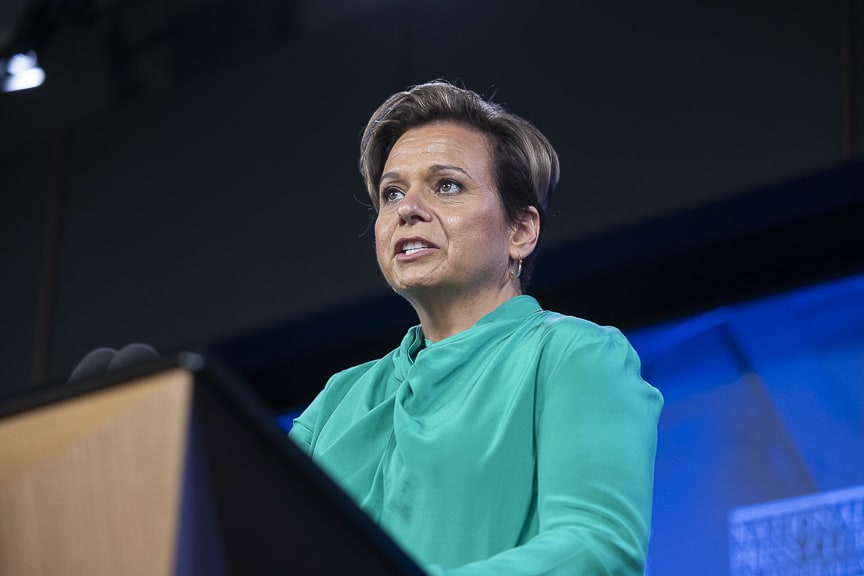The Albanese Government has claimed it is delivering on its election promise regarding access to FTA TV and keeping major sports on the anti-siphoning list.
New legislation is being introduced into Parliament this week.
Protecting channel choice
The Government has said the legislation will allow for a transition period after which television manufacturers will have to meet minimum prominence requirements for new devices sold in Australia.
The legislation will not be retrospective and will not impact associated hardware like remote controls.
Communications Minister Michelle Rowland (pictured above) said draft regulations will be released “early in 2024” and would contain the detail of the prominence requirements. The department did promise the new framework would “promote a level playing field for Australian FTA broadcasters, but will not constrain device manufacturers from promoting or recommending other content or services, or affect the search or customisation functions of a device.”
Minister Rowland said: “The new prominence framework will ensure Australians can easily find and access the local free-to-air television services they know, trust and value.
“Our existing analogue laws haven’t been updated to reflect the digital age.
“The rise of global streaming services means Australians could miss out on the free content and services they have enjoyed for generations, with free local services becoming harder to find on connected devices and content slipping behind online paywalls.”
A Foxtel Group spokesperson commented on the proposed legislation: “We are pleased to see the Government has taken on board our concerns with restricting search and customisation on smart TVs which would have led to significant frustration for consumers. We will need to examine the detail of the legislation and in the meantime will continue to advocate for Australians’ right to control their TVs and connected devices they spend thousands on every year and enjoy with their families.”
Free TV CEO Bridget Fair said: “Right now, Australian viewers are being steered in the direction of services that favour the commercial interests of big tech and TV manufacturers rather than being given access to the full set of free local television services that they want to watch. This legislation is an important step towards ensuring that people are not being served up incomplete viewing choices based on who has paid the most money to be in the line-up.

Bridget Fair
“While we are still awaiting full details of the legislation it is clear that there are still a few issues to be resolved with the Government’s proposed model. We look forward to participating in the next stage of discussions around this important issue.”
Anti-siphoning changes
The Government is also claiming it is “taking steps to modernise the anti-siphoning scheme” which will affirm the importance of iconic sporting events on FTA television.
The Government has noted the scheme should be broadened to include online broadcasting and streaming services.
The Government noted the expansion of the list would include women’s sports and Para-sports.
See also: Matildas impact: FIFA Women’s World Cup added to anti-siphoning list
“Modernising the anti-siphoning scheme will mean the iconic sporting events and moments that bring us together as a nation won’t slip behind the online paywalls of international streaming services,” Minister Rowland said.
“These reforms have been informed by extensive consultation with industry and the community.”
Foxtel reacted to the long-anticipated reforms: “This could have been a great opportunity for the Government to bring anti-siphoning laws into the 21st century to reflect viewing habits of Australians today and to protect the future value of much-loved Australian sport. The regime is already anti-competitive and clearly favours free-to-air broadcasters above Australians and above the needs of sporting bodies whose ability to invest in grassroots will be limited.
“Foxtel Group was advocating that truly iconic events of national significance could be streamed free via our free streaming platform that has been built and invested in locally and is used by more than a million Australians. The outcome adversely affects technology platforms like ours that have a greater capability to invest in world-class innovation to enhance the broadcast experience for Australians.”
Free TV was guarded in its response to the anti-siphoning list reforms: “The expansion of the current anti-siphoning rules to apply to subscription streaming services is an important new measure. However, there is still an element of analogue rules in a digital world with the failure to include free streaming rights in the proposed model. Australians should be able to watch key sporting events whether they choose to access our services through terrestrial broadcast or online streaming.”
Seven West Media welcomed the news. A statement from SWM managing director and chief executive officer, James Warburton, said: “As a proud, Australian-owned free-to-air television network, Seven welcomes Minister Rowland’s statement today, which backs up the Albanese Government’s stance on the issue of anti-
siphoning prior to the federal election. Seven will continue to fight fiercely to ensure all Australians can watch the sports they love live and free.”
